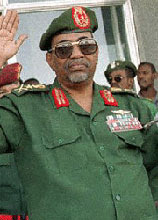
Violence in Kenya has taken a turn for the worse with Tuesday's assassination of an opposition lawmaker who had been working to end the crises. Ethnic militias armed with machetes continue to terrorize the slums of the capital Nairobi and towns across the country's west while the death toll in the fighting has topped more than 850.
Lord Mark Malloch Brown, who visited Kenya from the UK, issued a serious warning about the crises:
"We are greatly concerned at what we see as a step change in the violence from something bloody and ugly but perhaps spontaneous to something much more organised and sinister,"He continued on to say:
"What is so alarming about the last few days is that there are evidently hidden hands organising this now. Militias are appearing, street gangs are being organised."I hope I'm wrong when I say this, but this kind of violence seems all to familiar. In 1994, sporadic violence between Rwanda's Hutu and Tutsis ethnicities quickly spiraled out of control and became the infamous Rwandan Genocide, where over one million people were slaughtered across the country. Since then (and even before) this type of violence has reciprocated again and again in Africa, whether it be Rwanda, Darfur, Eastern Congo, South Sudan, or Somalia. Kenya's current situation may very well find its place up there if the conflict is not peacefully resolved and the machete-wielding militias are not disarmed.
Tensions grow next door:
While not really related, violence is also being reported in neighboring Somalia with the continuing street battles between Ethiopian/Somali coalition forces and Islamic insurgents armed with machine guns and rocket-propelled grenades. Yesterday, two foreign aid workers and a Somali journalist were killed when their vehicle hit a roadside bomb outside of Mogadishu. Kenya, which was once one of East Africa's most prosperous democracies, had the potential to serve as a role model to the struggling UN-backed government in Somalia. Kenyan forces have also wielded positive influence in the capture of Islamic militants along the border.
What can we do?
One of two things needs to happen in order to stop this from becoming the latest "Never Again" pledge. Either the people of Kenya must agree to put aside their differences and solve their problems through dialogue as opposed to the blade of a machete, or the UN and the international community must step in and do something before the militias become too powerful and the bodies of innocent men, women, and children begin piling up in the countryside. Leaders here in the U.S. need to play a constructive role as well. Senator Barack Obama, who is of Kenyan descent, has been actively involved in pushing for dialogue and an end to the killing. If everyone in Congress did so, it would certainly send a strong message. Today's violence in Kenya is a perfect example of how we can all put aside our political differences to work together and impact the world in a positive way.
...or we can continue doing what we're doing and have another "never again" pledge that we failed to live up to and add it to the pages of history.
(Photo courtesy of AP)










1 comment:
Great readiing
Post a Comment